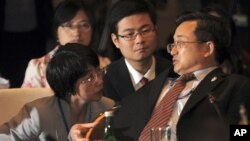Southeast Asian and Chinese officials say they have reached agreement on a set of guidelines that could lead eventually to a binding code of conduct for handling disputes in the South China Sea.
The officials said the agreement was reached Wednesday and will be submitted Thursday for approval by foreign ministers of their respective countries. The ministers are in the Indonesian resort of Bali for the annual meeting of the Association of Southeast Asian Nations.
Agreement details
The officials said the guidelines spell out how the countries should implement a Declaration of Conduct that they signed in 2002. Vietnamese negotiator Pham Quang Vinh called the agreement a "good start" toward the ultimate goal of an agreement on a binding Code of Conduct that could be used to settle South China Sea disputes.
However some diplomats who have seen the single page set of guidelines said they do not address the most difficult issues causing tension in the strategic and potentially oil- and gas-rich waterway.
The diplomats say the guidelines call for claimants to disputed areas of the sea to reach consensus before beginning cooperative projects in the waterway. But they say potential joint projects are limited to such areas as scientific research and rescue operations. There was no immediate mention of oil and gas exploration, potentially the most divisive issue.
Actionable framework
Philippine Foreign Secretary Albert del Rosario told reporters he was disappointed that the guidelines did not provide an "actionable framework" to distinguish between disputed parts of the sea and undisputed parts. He also expressed frustration at trying to negotiate an agreement with China when that country insists that it has sovereignty over the entire body of water.
Other diplomats said the guidelines provide for annual reports to the ASEAN and Chinese ministers describing progress toward undertaking joint activities in the South China Sea. Chinese officials said they also proposed the convening of a symposium on freedom of navigation in the sea.
Overlapping claims
China, Taiwan and four ASEAN members - Vietnam, the Philippines, Malaysia and Brunei - all have overlapping territorial claims in the sea, where countries have been stepping up their oil and gas exploration.
In the 2002 declaration, the signatories agreed to settle South China Sea disputes through friendly negotiation and to avoid activities that would complicate or escalate disputes.
However Vietnam and the Philippines have complained of Chinese naval vessels interfering with oil exploration in waters they claim as their exclusive economic zones.
Del Rosario said the Philippines will likely take its dispute with China to the United Nations' International Tribunal for the Law of the Sea. China has already ruled out a joint referral to the tribunal, but del Rosario said it is possible for a country to go to the panel unilaterally for a non-binding decision.
ASEAN, Beijing Agree on Guidelines for China Sea Settlement




